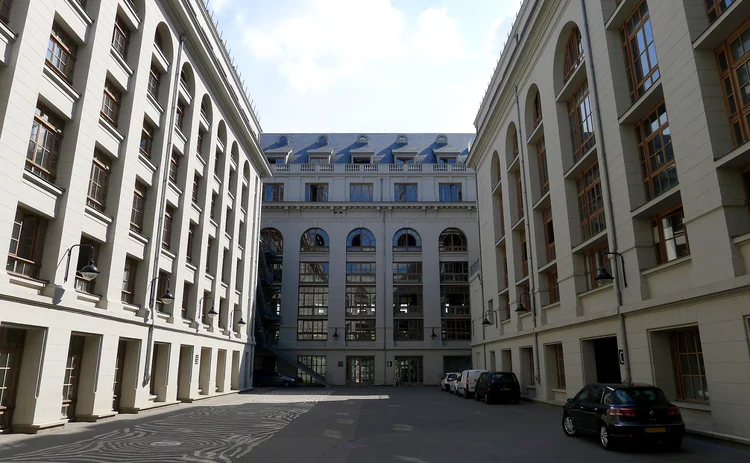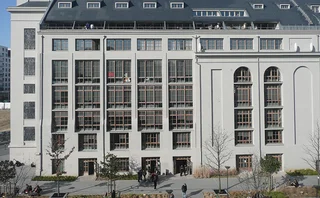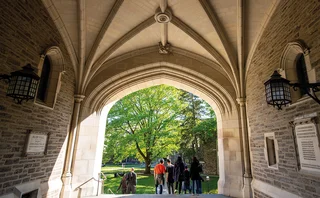
Quant Guide 2017: Paris Diderot University
Paris, France

Master in Statistics, Probability and Finance | metrics table at end of article
Since its launch 30 years ago, the master’s in statistics, probabilities and finance run by Paris Diderot University has established itself as a leading quant programme. An ability to keep up with the times may explain some of its success, one alumnus suggests.
“At the time it was one of the few master’s programmes that was offering machine learning and data science,” says Fiodor Gorokhovik, who graduated in 2014 and now works in structured products ‘strats’, or quantitative strategies, at Goldman Sachs in London.
“I didn’t want to do a theoretical programme – many people end up using a limited proportion of what they actually studied – and my degree was more applied, but with modules on pure maths. I use a large proportion of what I studied in my job,” he adds.
In total, the year-long programme comprises 30 courses, of which four are compulsory: stochastic calculus, data modelling, Markov chains and data mining. Students can then choose between two distinct tracks: statistics and stochastic models in finance, or statistics and data science.

The list of modules for both tracks is regularly updated. For example, a module on computational statistics has been introduced recently, adding to an existing computer science course, which includes programming in C++.
“We have a long partnership with the industry; every two to three years we adapt our courses to the needs of the industry,” says Huyên Pham, programme co-director.
Links with the financial industry are strong in other ways too: eight of the courses are taught by practitioners, and students have to spend at least four months gaining professional experience. Internship offers come from companies such as Barclays, Crédit Agricole, Credit Suisse, Natixis and Societe Generale.
Many students stay on at the firms where they interned, joining the ranks of the 90% of the programme’s graduates who find jobs in finance within six months of graduating.
The university is also open to ideas coming from students, says Gorokhovik. “In the past we recommended adding courses in Python and more courses in machine learning, which were added.”
At present, the master’s is taught entirely in French but from the next academic year some modules will be delivered in English, starting with compulsory subjects.
The aim is to attract more international students – who currently make up less than 5% of the total intake – expanding the reach of one of the most competitive and venerable quant programmes in France.
Like its peer master’s at Pierre and Marie Curie University, it requires applicants to have a solid background in mathematics and, similarly, features the name of its founder in its commonly known previous name: DEA Laure Elie.

Click here for links to the other universities and an explanation of how to read the metrics tables
Only users who have a paid subscription or are part of a corporate subscription are able to print or copy content.
To access these options, along with all other subscription benefits, please contact info@risk.net or view our subscription options here: http://subscriptions.risk.net/subscribe
You are currently unable to print this content. Please contact info@risk.net to find out more.
You are currently unable to copy this content. Please contact info@risk.net to find out more.
Copyright Infopro Digital Limited. All rights reserved.
As outlined in our terms and conditions, https://www.infopro-digital.com/terms-and-conditions/subscriptions/ (point 2.4), printing is limited to a single copy.
If you would like to purchase additional rights please email info@risk.net
Copyright Infopro Digital Limited. All rights reserved.
You may share this content using our article tools. As outlined in our terms and conditions, https://www.infopro-digital.com/terms-and-conditions/subscriptions/ (clause 2.4), an Authorised User may only make one copy of the materials for their own personal use. You must also comply with the restrictions in clause 2.5.
If you would like to purchase additional rights please email info@risk.net
More on Quantitative finance
Quant Finance Master’s Guide 2025
Risk.net’s guide to the world’s leading quant master’s programmes, with the top 25 schools ranked
Baruch maintains top spot in 2025 Quant Master’s Guide
Sorbonne reclaims top spot among European schools, even as US salaries decouple
Quant Finance Master’s Guide 2023
Risk.net’s guide to the world’s leading quant master’s programmes, with the top 25 schools ranked
Baruch topples Princeton in Risk.net’s quant master’s rankings
US schools cement top five dominance as graduate salaries soar
Is it worth doing a quant master’s degree?
UBS’s Gordon Lee – veteran quant and grad student supervisor – asks the hard question
Starting salaries jump for top quant grads
Quant Guide 2022: Goldman’s move to pay postgrads more is pushing up incomes, says programme director
Quant Finance Master’s Guide 2022
Risk.net’s guide to the world’s leading quant master’s programmes, with the top 25 schools ranked
Princeton, Baruch and Berkeley top for quant master’s degrees
Eight of 10 leading schools for quantitative finance programmes are based in US, latest rankings show







